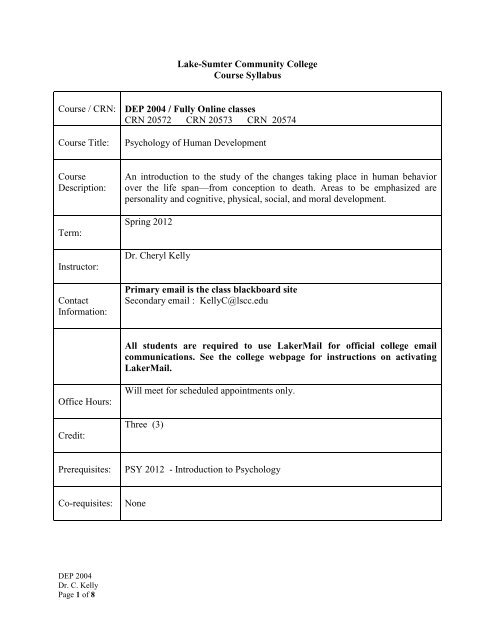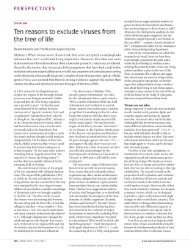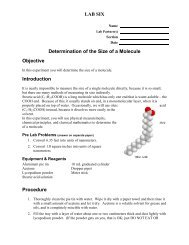Syllabus Spring 2012 DEP 2004 - Lake-Sumter Community College
Syllabus Spring 2012 DEP 2004 - Lake-Sumter Community College
Syllabus Spring 2012 DEP 2004 - Lake-Sumter Community College
Create successful ePaper yourself
Turn your PDF publications into a flip-book with our unique Google optimized e-Paper software.
Course / CRN:<br />
Course Title:<br />
Course<br />
Description:<br />
Term:<br />
Instructor:<br />
Contact<br />
Information:<br />
Office Hours:<br />
Credit:<br />
Prerequisites:<br />
Co-requisites:<br />
<strong>DEP</strong> <strong>2004</strong><br />
Dr. C. Kelly<br />
Page 1 of 8<br />
<strong>Lake</strong>-<strong>Sumter</strong> <strong>Community</strong> <strong>College</strong><br />
Course <strong>Syllabus</strong><br />
<strong>DEP</strong> <strong>2004</strong> / Fully Online classes<br />
CRN 20572 CRN 20573 CRN 20574<br />
Psychology of Human Development<br />
An introduction to the study of the changes taking place in human behavior<br />
over the life span—from conception to death. Areas to be emphasized are<br />
personality and cognitive, physical, social, and moral development.<br />
<strong>Spring</strong> <strong>2012</strong><br />
Dr. Cheryl Kelly<br />
Primary email is the class blackboard site<br />
Secondary email : KellyC@lscc.edu<br />
All students are required to use <strong>Lake</strong>rMail for official college email<br />
communications. See the college webpage for instructions on activating<br />
<strong>Lake</strong>rMail.<br />
Will meet for scheduled appointments only.<br />
Three (3)<br />
PSY <strong>2012</strong> - Introduction to Psychology<br />
None
Student<br />
Learning<br />
Outcomes &<br />
Competencies:<br />
<strong>DEP</strong> <strong>2004</strong><br />
Dr. C. Kelly<br />
Page 2 of 8<br />
The student will be able to demonstrate the following competencies:<br />
demonstrate ability to research related topics via internet access.<br />
describe and evaluate all research techniques applicable to the study of<br />
development and define all pertinent terms.<br />
know and be able to compare, contrast and integrate various theories<br />
applicable to the development of human beings which have been<br />
suggested by psychoanalysts, behaviorists, cognitive psychologists and<br />
humanistic psychologists.<br />
have basic knowledge of the mechanisms of genetics, inherited traits<br />
and disorders.<br />
understand and be able to discuss and apply the socialization process,<br />
including the influence of television.<br />
understand the established sex differences and how sex roles behavior<br />
develop.<br />
describe the three stages of prenatal development, all the support<br />
structures, methods of testing prenatal development and causes of<br />
prenatal defects.<br />
describe the three stages of childbirth including the various births<br />
positions of the child, the method of prepared childbirth and the issues<br />
surrounding birthing centers, hospitals and home births.<br />
describe a healthy neonate and understand the use of the Apgar scale<br />
and the purpose of measuring infant reflexes.<br />
discuss the criteria for determining prematurity.<br />
describe physical development from infancy through late adulthood<br />
including growing trends.<br />
describe the perceptual abilities from birth through late adulthood.<br />
understand the stages of language development and the factors that<br />
facilitate such development.<br />
describe the types and stages of play throughout childhood and the<br />
development of friendship during childhood and adolescence.<br />
describe the types of early childhood education and discuss the<br />
problems within our educational system as a whole.<br />
describe the process of attachment and the emotional development of<br />
children including their fears and anxieties and the defense mechanisms<br />
which may be used.<br />
discuss pro-social and aggressive behavior and the possible hereditary<br />
and environmental influences on each.<br />
describe stages of memory and development of the use of memory in<br />
.<br />
describe various aspects of parenting including styles and discine,<br />
parental roles, stages of parenting, single parents, step-parents as well as<br />
the choice to remain childless and the impact of working mothers.<br />
describe current theories concerning child abuse and discuss possible<br />
methods of prevention.
Reading<br />
Material:<br />
Technology &<br />
Online<br />
Computer<br />
Access<br />
Requirements:<br />
Course<br />
Objectives:<br />
<strong>DEP</strong> <strong>2004</strong><br />
Dr. C. Kelly<br />
Page 3 of 8<br />
describe various aspects of parenting including styles and discipline,<br />
parental roles, stages of parenting, single parents, step-parents as well as<br />
the choice to remain childless and the impact of working mothers.<br />
describe current theories concerning child abuse and discuss possible<br />
methods of prevention.<br />
describe the process of puberty, adolescent identity formation and<br />
egocentrism.<br />
discuss problems of adolescence such as substance abuse, sexuality,<br />
runaways, crime and suicide.<br />
describe the components of intimacy, love marriage as well as<br />
alternatives to marriage such as cohabitation and single-by-choice, and<br />
the end of marriage by death or divorce.<br />
describe career choice and stages and the problems of today’s workers,<br />
including working women.<br />
describe fluid and crystallized intelligence and how they change over<br />
the lifespan.<br />
describe symptoms of senility and Alzheimer’s disease.<br />
describe the process of retirement and its impact on the adult.<br />
describe Kübler-Ross’ stages of reactions to death and bereavement, and<br />
compare to those of Schneidman and Pattison.<br />
discuss the issue of euthanasia vs. hospice and describe the concept of a<br />
right to die.<br />
Textbook – Experiencing the Lifespan - 2 nd Edition, J. Belsky; Worth<br />
Publishers.<br />
Students must have reliable Internet access and computer skills to complete<br />
assignments. Students may use their own home computers or use one at the<br />
library.<br />
To acquaint the student with all aspects of development over the life<br />
span.<br />
To investigate the course and influence of physical, emotional, cognitive<br />
and moral development.<br />
To study and evaluate socialization processes and the structure of and<br />
cultural influences on the family.
Academic<br />
Integrity:<br />
Important<br />
Information<br />
for<br />
Students With<br />
Disabilities:<br />
Privacy Policy<br />
(FERPA):<br />
Attendance /<br />
Withdrawal<br />
Policies:<br />
Withdrawal<br />
Deadline<br />
<strong>DEP</strong> <strong>2004</strong><br />
Dr. C. Kelly<br />
Page 4 of 8<br />
The successful functioning of the academic community demands honesty,<br />
which is the basis of respect for both ideas and persons. In the academic<br />
community, there is an ongoing assumption of academic integrity at all levels.<br />
There is the expectation that work will be independently thoughtful and<br />
responsible as to its sources of information and inspiration. Honesty is an<br />
appropriate consideration in other ways as well, including but not limited to the<br />
responsible use of library resources, responsible conduct in examinations, and<br />
the responsible use of the Internet. (See college catalog for complete<br />
statement.)<br />
Any student with a documented disability who requires assistance or academic<br />
accommodations should contact the Office for Students with Disabilities<br />
immediately to discuss eligibility. The Office for Students with Disabilities<br />
(OSD) is located on the Leesburg Campus, but arrangements can be made to<br />
meet with a student on any campus. An appointment can be made by calling<br />
352-365-3574 and specific information about the OSD and potential services<br />
can be found at www.lscc.edu, then go to ―Quick Links‖ and click on Disability<br />
Services.<br />
The Family Educational Rights and Privacy Act (FERPA) (20 U.S.C. § 1232g;<br />
34 CFR Part99) is a Federal law that protects the privacy of a student’s<br />
education records. In order for your information to be released, a form must be<br />
signed and in your records located in the Admissions/Registrar’s Office.<br />
This is an online class. Full participation throughout course is mandatory.<br />
March 23, <strong>2012</strong>
Methods of<br />
Evaluation<br />
Course<br />
Content /<br />
Calendar:<br />
Classroom<br />
Rules &<br />
Policies:<br />
<strong>Syllabus</strong><br />
Disclaimer:<br />
<strong>DEP</strong> <strong>2004</strong><br />
Dr. C. Kelly<br />
Page 5 of 8<br />
The textbook must be read. You are responsible for all material in the text,<br />
whether covered in the class or not, and all text material may appear on exams.<br />
Course agenda schedule may be revised through the term.<br />
Quizzes/Tests/Chapter assignments: Following each chapter you will take a<br />
short quiz that requires direct application of material in the assigned chapter.<br />
Each quiz is worth 20 points. The goal is to encourage development of critical<br />
thinking skills and identify potential problems prior to taking larger tests. You<br />
will usually have a five day window to complete them.<br />
Ässignments: There is a reading assignment (worth 15 points) and a chapter<br />
assignment (worth 25 points) for each chapter. They may be fill in the blanks,<br />
matching or discussions.<br />
Exams: There are 2 exams this term. The midterm exam covers<br />
chapters 1 – 8; the final exam covers chapters 9 – 15. Both will<br />
be taken online and are worth 50 points each.<br />
Maximum points that can be earned during the semester are 1000.<br />
There are no “dropped” grades. You get to keep everything that you<br />
earn! The instructor reserves the right to modify the point assignment<br />
as needed.<br />
Assignments <strong>DEP</strong> <strong>2004</strong> <strong>Spring</strong> <strong>2012</strong> ONLINE.docx<br />
Online participation is critical for fully online classes. You are responsible for<br />
accessing BlackBoard (Bb) on a daily basis. Refer to the complete withdrawal<br />
policy in the <strong>College</strong> catalog. Please familiarize yourself with it. Students are<br />
responsible for all work assigned. This includes all chapter material as<br />
outlined in the course calendar, course agenda and on the syllabus. No late<br />
assignments will be accepted. NO EXCEPTIONS. Lack of participation will<br />
result in diminished success.<br />
Information contained in this syllabus is, to the best knowledge of this<br />
instructor, considered correct and complete when distributed to the student.<br />
The instructor reserves the right, acting within policies and procedures of <strong>Lake</strong>-<br />
<strong>Sumter</strong> <strong>Community</strong> <strong>College</strong>, to make necessary changes in course content or<br />
instructional techniques without prior notice or obligation to the student.
Violence<br />
Statement:<br />
<strong>DEP</strong> <strong>2004</strong><br />
Dr. C. Kelly<br />
Page 6 of 8<br />
<strong>Lake</strong>-<strong>Sumter</strong> <strong>Community</strong> <strong>College</strong> has a policy of zero tolerance for violence<br />
as stated in <strong>College</strong> Board Rule 2.17. Appropriate disciplinary action will be<br />
taken in accordance with Board Rule 2.17.
<strong>DEP</strong> <strong>2004</strong> Developmental Psychology – Dr. Cheryl Kelly<br />
Summer Tuesday Class <strong>DEP</strong> <strong>2004</strong> – CRN 30231 Bldg 2 Rm 204<br />
Class Assignment Calendar<br />
Date Type Chapter Quiz Discussion Assignments Due<br />
5/10/11 Live Ch. 1 – People & the Field 1 Introductions 5/15/11<br />
5/17/11 Live Ch. 2 – Prenatal, Preg & Birth 2 5/22/11<br />
5/24/11 Online Ch. 3 – Infancy, Physical & 3 & 4 Practice 5/29/11<br />
Cog Development & Chapter 4<br />
– Infancy<br />
drop box<br />
5/31/11 Online Ch. 5 – Childhood - Physical 5 Childhood 6/5/11<br />
& Cognitive Development<br />
development<br />
6/7/11 Live Ch. 6 – Childhood Socio- 6 Emotional<br />
6/12/11<br />
emotional Development<br />
Regulation<br />
6/14/11 Online Ch. 7 Home & School & Ch. 8<br />
Physical Development<br />
7 & 8 6/19/11<br />
6/21/11 Online MIDTERM EXAM<br />
1 - 8 6/26/11<br />
6/28/11<br />
Live<br />
Ch. 9 – Cognitive &<br />
Socioemotional Development<br />
& Ch 10 – Constructing an<br />
Adult<br />
Chapt <strong>DEP</strong> Quiz <strong>2004</strong> (15) 30 pts each 450<br />
Exams Dr. C. Kelly (2) 100 pts each 200<br />
Page 7 of 8<br />
Total 1000<br />
9 &<br />
10<br />
7/3/11<br />
7/5/11 Online Ch. 11 – Relationships & Roles 11 Changes that 7/10/11<br />
occur in<br />
7/12/11 Online Ch. 12 – Midlife 12 Midlife<br />
adolescence<br />
7/17/11<br />
7/19/11 Live Ch. 13 – Later Life Cog & 13 7/2411<br />
Socioemotional Development<br />
7/26/11 Online Ch. 14 – Physical Changes of<br />
Old Age<br />
14 3 things you<br />
learned<br />
7/31/11<br />
8/2/11 Online Ch. 15 – Death & Dying 15 8/7/11<br />
8/2/11 Online FINAL EXAM *** Note<br />
Dates***<br />
8/9/11<br />
Attendance (15) 10 pts each 150<br />
Assignments (4) 40 pts each 160<br />
Discussion Assgn (2) 20 pts each 40<br />
A = 900 – 1000<br />
B = 800 - 899<br />
C = 700 – 799<br />
D = 600 – 699<br />
F = 599 and below
<strong>DEP</strong> <strong>2004</strong> Developmental Psychology – Dr. Cheryl Kelly<br />
Summer 2011 Wednesday Class <strong>DEP</strong> <strong>2004</strong> – CRN 30232 Bldg 2 Rm 204<br />
Assignment Calendar<br />
Date Type Chapter Quiz Discussion Assignments Due<br />
5/11/11 Live Ch. 1 – People & the Field 1 Introductions 5/16/11<br />
5/18/11 Live Ch. 2 – Prenatal, Preg & Birth<br />
Ch. 3 – Infancy, Physical &<br />
Cog Development<br />
Chapt <strong>DEP</strong> Quiz <strong>2004</strong> (15) 30 pts each 450<br />
Exams Dr. C. Kelly (2) 100 pts each 200<br />
Page 8 of 8<br />
Total 1000<br />
2 & 3 5/23/11<br />
5/25/11 Online Chapter 4 – Infancy 4 Practice<br />
drop box<br />
6/1/11 Online Ch. 5 – Childhood - Physical<br />
& Cognitive Development<br />
6/8/11 Live Ch. 6 – Childhood Socioemotional<br />
Development<br />
6/15/11 Online Ch. 7 Home & School & Ch. 8<br />
Physical Development<br />
6/22/11 Online MIDTERM EXAM<br />
6/29/11<br />
Live<br />
Ch. 9 – Cognitive &<br />
Socioemotional Development<br />
& Ch 10 – Constructing an<br />
Adult<br />
5/30/11<br />
5 Childhood<br />
development<br />
6/6/11<br />
6 Emotional<br />
Regulation<br />
6/13/11<br />
7 & 8 6/20/11<br />
1 - 8 6/27/11<br />
9 &<br />
10<br />
7/4/11<br />
7/6/11 Online Ch. 11 – Relationships & Roles 11 Changes that 7/11/11<br />
occur in<br />
7/13/11 Online Ch. 12 – Midlife 12 Midlife<br />
adolescence<br />
7/18/11<br />
7/20/11 Live Ch. 13 – Later Life Cog & 13 7/2411<br />
Socioemotional Development<br />
7/27/11 Online Ch. 14 – Physical Changes of<br />
Old Age<br />
14 3 things you<br />
learned<br />
8/1/11<br />
8/3/11 Online Ch. 15 – Death & Dying 15 8/8/11<br />
8/3/11 Online FINAL EXAM *** Note<br />
Dates***<br />
8/9/11<br />
Attendance (15) 10 pts each 150<br />
Assignments (4) 40 pts each 160<br />
Discussion Assgn (2) 20 pts each 40<br />
A = 900 – 1000<br />
B = 800 - 899<br />
C = 700 – 799<br />
D = 600 – 699<br />
F = 599 and below
















